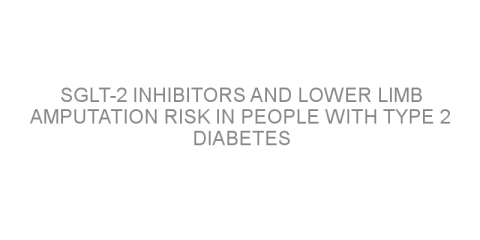In a nutshell This study investigated the link between sodium-glucose cotransporter 2 inhibitors (SGLT2is) and eye (ocular) diseases in patients with type 2 diabetes (T2D). The data showed that there was no link between the occurrence of eye diseases and SGLT2is in these patients. Some SGLT2is such as ertugliflozin (Steglatro) and empagliflozin...
Read MoreNon-insulin oral drug(s)-Other Posts on Medivizor
Can canagliflozin improve insulin resistance and internal fat tissue in patients with type 2 diabetes better than metformin?
In a nutshell This study assessed the effects of canagliflozin (Invokana) therapy on body composition, glucose control, insulin resistance, and systemic (whole body) inflammation in patients with newly-diagnosed type 2 diabetes (T2D) compared to metformin (Glucophage). The data showed that canagliflozin therapy reduced visceral fat tissue, and...
Read MoreDo SGLT2 inhibitor medications increase ketoacidosis risk?
In a nutshell This review looked at whether SGLT2 inhibitors increase the risk of ketoacidosis in patients with type 2 diabetes (T2D). It found that long-term use of these medications increases the risk of ketoacidosis, particularly for older patients. Some background Type 2 diabetes (T2D) is a disorder involving high levels of glucose (sugar) in...
Read MoreComparing semaglutide and canagliflozin for patients with Type 2 diabetes
In a nutshell This study compared the safety and effectiveness of semaglutide (Ozempic) and canagliflozin (Invokana) for patients with uncontrolled type 2 diabetes (T2D). The authors found that semaglutide more effectively reduced blood glucose levels and body weight than canagliflozin. Some background Often, patients with T2D are given...
Read MoreEvaluating the safety of glimepiride for patients with Type 2 diabetes
In a nutshell This study evaluated the side effects in patients with type 2 diabetes (T2D) after treatment with glimepiride (Amaryl). The authors found that while glimepiride lowered mortality, the rate of most side effects was the same as other similar drugs. Some background Treatments for T2D aim to lower blood glucose...
Read MoreSGLT-2 inhibitors and lower limb amputation risk in people with type 2 diabetes
In a nutshell This study wanted to find out if treating type 2 diabetes with SGLT-2 inhibitors increases the risk of disease in blood vessels or the risk of amputation of the feet. The study found that treating type 2 diabetes with certain SGLT-2 inhibitors such as canagliflozin (Invokana) may be associated with an increased risk of disease in the...
Read MoreDPP-4 inhibitor use in type 2 diabetes and the risk of diabetic eye disease
In a nutshell This study aimed to investigate if the use of DPP-4 inhibitor drugs for the treatment of type 2 diabetes (T2D) was harmful or helpful in diabetic retinopathy (DR; eye disease). The main finding of this study was that DPP-4 inhibitors did not increase the overall risk of DR. Some background DPP-4 inhibitors (DPP4i) are a type drug used to...
Read MoreDo SGLT2 inhibitors prevent cardiovascular complications in type 2 diabetes?
In a nutshell This study investigated whether SGLT2 (sodium-glucose co-transporter-2) inhibitors reduced the risk of cardiovascular complications in patients with type 2 diabetes. They found that SGLT2 inhibitors were associated with reduced risk of cardiovascular disease and mortality compared to other treatment types. Some background...
Read MoreThird time’s the charm? Adding a third treatment in uncontrolled type 2 diabetes
In a nutshell This study examined the effects of adding dapagliflozin (Farxiga) in patients with uncontrolled type 2 diabetes despite taking metformin (Glucophage) plus a sulfonylurea (such as Amaryl or Glucotrol). Some background Metformin increases the body’s sensitivity to insulin, and is generally the...
Read MoreA comparison between the effects of Sulfonylurea and Metformin on cardiovascular events in patients with type 2 Diabetes Mellitus
In a nutshell The present study compared the effects of therapy with either Metformin or Sulfonylureas (Glyburide, Glipizide) on cardiovascular events (heart attack and stroke) or death in patients with type 2 diabetes mellitus (DM2). The main findings were that treatment with Sulfonylurea was associated with an increased risk of cardiovascular disease...
Read More











